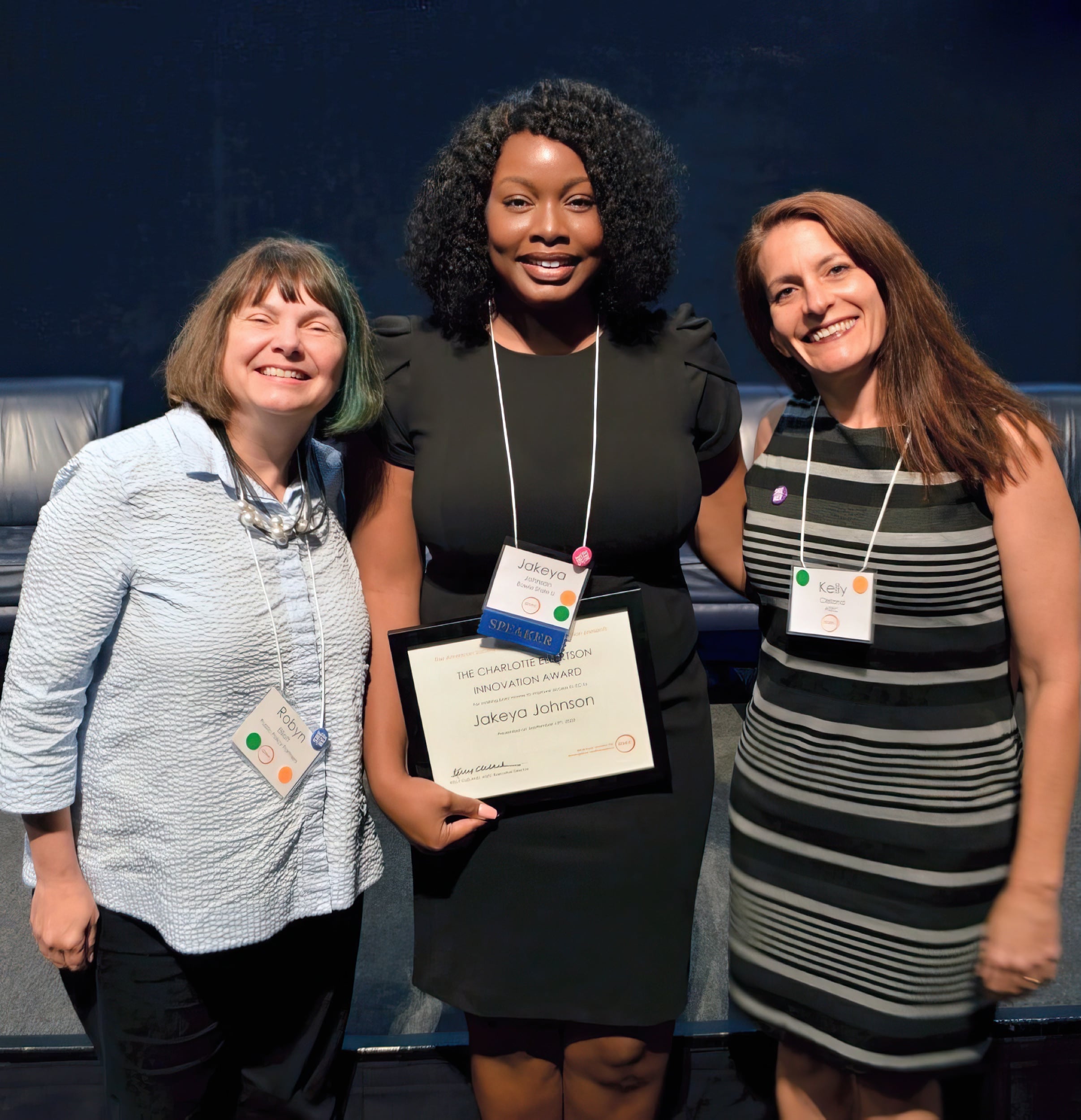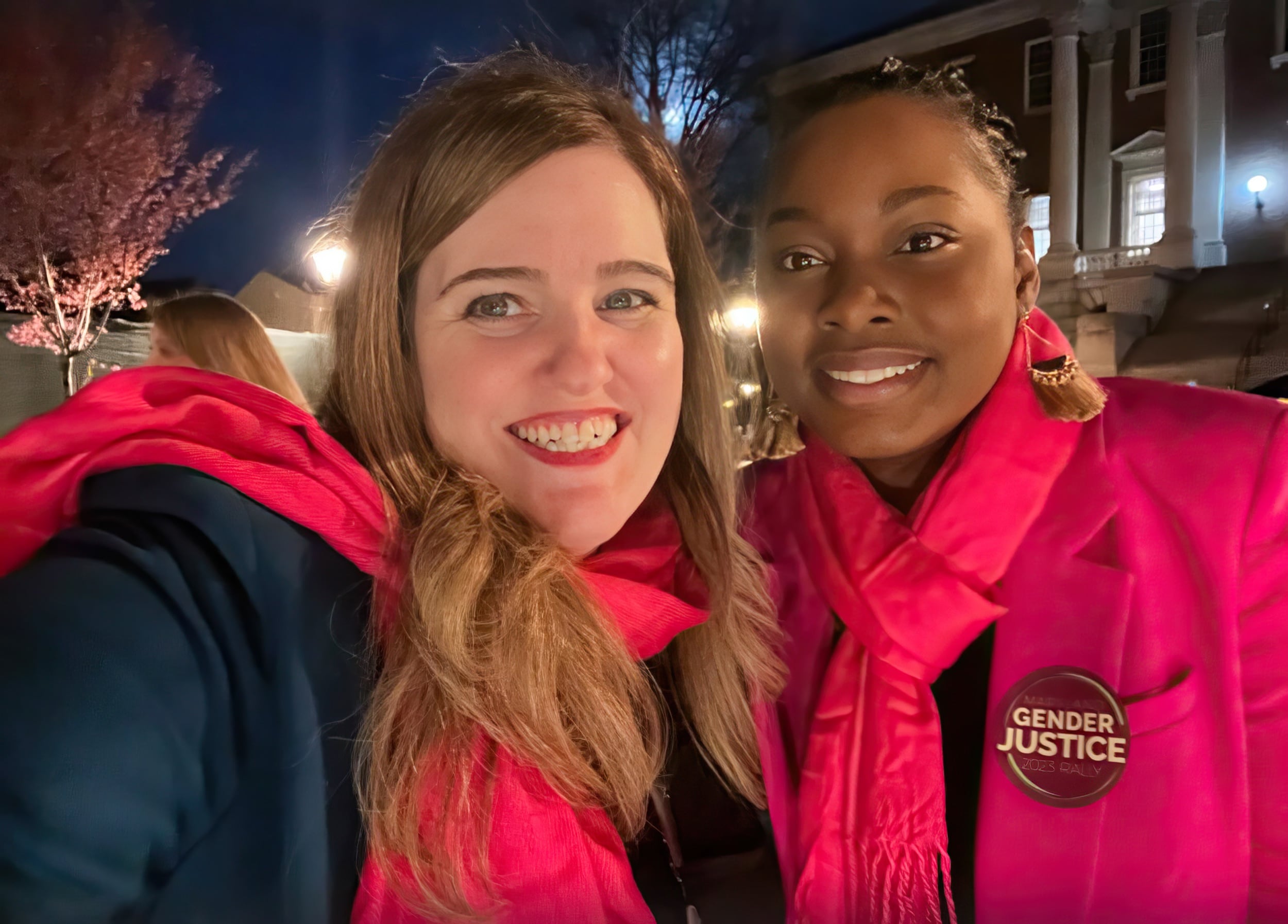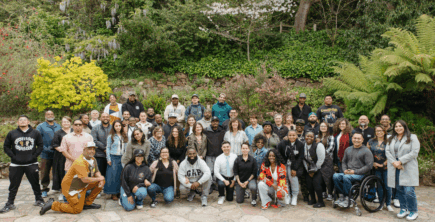
LGBT

Growing up in small-town Alabama, Jakeya Johnson just wanted a straight answer about reproductive health.
“In middle and high school, our health classes and sex education were abstinence-only,” Johnson explains. “If people had questions about anything else, they didn’t give us real answers. I started doing my own research because that didn’t seem right to me.”
What she found online, however, didn’t exactly clear things up. Johnson read a lot of conflicting stories and found herself trying to piece together what made sense to her. “I knew it didn’t feel right to tell people what they can and can’t do with their bodies,” she says. “If I needed to make a tough decision, I didn’t want someone telling me I couldn’t do that.”

Jakeya Johnson receives an innovation award from the Society for Emergency Contraception for her work in improving access to emergency contraception.
Today, Johnson, who serves as a grant specialist at Tides Network, remains passionate about reproductive rights and healthcare access. One of her most notable achievements so far is writing a policy that was turned into legislation requiring Maryland public higher education institutions to provide students with comprehensive reproductive health services, including emergency contraception.
Though she had an early interest in reproductive health, Johnson wasn’t sure what she wanted to do when she finished high school. She began an undergraduate program in healthcare administration. “I knew about halfway through that it wasn’t right for me, but at that point, I needed to finish,” she recalls.
After graduation, she worked in healthcare for a while before leaving her position. As she contemplated her next move, she began volunteering with social justice organizations involved with reproductive justice work, voting rights, and other causes. “I realized that was what I was passionate about,” she recalls. “I wanted something mission-driven I could feel connected to, and that’s when I decided to earn my master’s in public policy and administration.”
Johnson moved to Maryland after being accepted to Bowie State University, an HBCU — something that was important to her because she didn’t have that experience as an undergraduate. She went on to secure a philanthropy fellowship at Tides, where she learned about best pracatices in strategic philanthropy and social impact, before she transitioned into her current role as a grants specialist.
For her very first class in graduate school, Johnson was tasked with finding a real-world public program and proposing a hypothetical policy solution, and she realized the campus’s reproductive health services were lacking. Not wanting the project to be too broad in scope, she honed in on emergency contraception.
“At my school, they offered routine gynecological exams and counseling for sexual assault. There was no emergency contraception on campus. There was one place they’d refer students to that was about one hour and 45 minutes away via public transport.”
Johnson called that facility every day at different times and was never able to get anyone on the phone. There was no website and no information about whether students needed insurance or an appointment, or anything else. “That same place is still listed on the school website even though it says ‘Permanently Closed’ on their site,” Johnson states.
For her class, she came up with a plan for the school to offer emergency contraception. Then she thought, “Why not propose this to the university?” She spoke with the health center and dean of Services, but the school didn’t want to invest financially.

Jakeya Johnson pictured with Maryland Senator Ariana Kelly.
Johnson didn’t let that stop her. She began speaking with students at other Maryland universities, doing surveys and research to find out what services other schools offered. What she found was a consistent statewide lack of access to emergency health contraception and other reproductive health-related services.
After a year and a half of research, Johnson wrote a policy and emailed Maryland Senator Ariana Kelly. She’d been turned down already by a different legislator, but she knew Senator Kelly had a track record of advocating for reproductive justice issues. “I was not optimistic about it, but she called me out of the blue,” Johnson says.
The legislative process was long and arduous, but the bill goes into effect August 1, 2024, which is a huge win for the state of Maryland. Johnson’s efforts have not gone unnoticed: In September 2023, the American Society for Emergency Contraception awarded Johnson an innovation award for her work in improving access to emergency contraception. She was also named as one of The Daily Record’s Leading Women Under 40.
If you’re inspired by Johnson’s story and want to improve access to reproductive health services, Johnson’s biggest advice is to be true to yourself but also consider others.
“I know for a lot of people, they go into advocacy or a specific issue because they have a really personal experience that has changed their lives,” she explains. “But when you do this kind of work, you can’t just focus on your own specific experience. It’s important to consider other people’s experiences and how the work you’re doing will affect the most marginalized communities. As long as you do those things, you’ll do great work.”
She also points to the importance of flexibility and persistence. Throughout the legislative process, Johnson needed to be flexible and negotiate on certain things in order for the policy to pass. For example, originally the bill required that schools provide wraparound services, like transportation services if a student needed to go off campus, but schools didn’t want to be financially liable for that, so that language was removed. Yet Johnson kept going.
“If I just stopped at the ‘no’ that I got from my university, then this legislation wouldn’t be what it is now. Just keep going. It took a lot longer than I thought it would take, but it was well worth it.”

LGBT

Corporate Partners

Philanthropy

Read the stories and hear the voices of social change leaders fighting for justice.